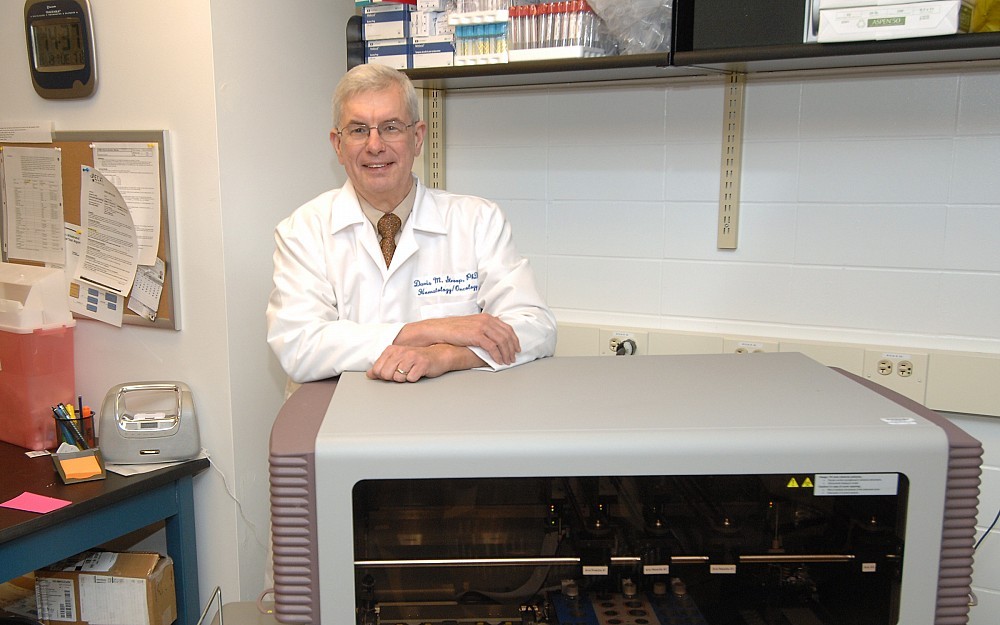
For UC's Oldest Graduate, Persistence Pays Off With a PhD
The last time Davis Stroop, PhD, participated in commencement exercises, it was 1966 and he was graduating from Fairmont East High School in Kettering, Ohio. Almost 50 years later, hell be donning cap and gown again for UCs doctoral hooding and masters recognition ceremony Friday, Dec. 13.
At 65, Stroop will be the oldest graduate for the summer and fall 2013 semesters over two days of commencement activities (baccalaureate and associate ceremonies are Saturday, Dec. 14). And hell no doubt also be one of the most persistent.
His pursuit of a PhD in epidemiology, earned in the UC Department of Environmental Healths Division of Epidemiology and Biostatistics, officially began with his application for a doctorate in 2002, butas he puts it"I kept getting sidetracked. As a 30-year member of the U.S. Army Reserves who retired as a full colonel in 2008, he answered the call of duty for a number of investigations elsewhere in the United States and prepared subordinate units and soldiers for mobilization and deployment. And three years ago he had a detached retina, which required four operations and temporarily kept him from using a computer.
Along with persistence, Stroopa senior research assistant in the Cancer and Blood Diseases Institute at Cincinnati Childrens Hospital Medical Center who conducts clinical and investigative platelet function analysiscredits tuition remission and a supportive work environment for his academic success. He doesnt just have the PhD (and a masters) to his credit; his post-college learning includes courses at UC, Ohio State University, the University of Dayton and Wright State University in a variety of disciplines including anthropology, geology, geography, astronomy, matrix analysis and various other prerequisites for electrical engineering.
"I had this urge to learn, and I had the good fortune to always work for employers that supported college tuition, says Stroop, who has also worked in private industry and at Ohio State and UC. (His research associate position at UC was abolished in 1994, and he was hired at Cincinnati Childrens.)
Stroop has an innate humility (few courses exist for that) which causes him to say things like, "I piddled around, taking course after course after course, and ended up with a masters degree in epidemiology. But its hard to downplay his feat, which began almost immediately upon his graduation from Ohio University in 1970. (Due to demonstrations against the escalation of the Vietnam War, commencement ceremonies at Ohio University and other colleges including UC were canceled; Stroop mailed off for his diploma.)
With a pre-med degree in zoology, Stroop aspired to go to medical school but wanted a masters degree in clinical pathology as a stepping stone. Applying at Ohio State Universitys graduate school, he was told the program was for medical technologists only. He set out to earn a second bachelors degree in medical technology and received it in 1973.
Deciding that he wanted to be an immunologista new field at the timehe began work on a graduate degree in microbiology at Ohio State with a specialization in immunology. But his then-wife wanted to move to Cincinnati to be closer to her best friend and college roommate.
Stroop made the move ("I looked at UCs medical school and graduate school program and said, "This is for me) and promptly began taking graduate microbiology and biochemistry courses while working full time at UCs clinical laboratories. But he also squeezed in courses at UCs evening college, including "probably every business management course they offered.
Stroop and his wife divorced in 1980, and he essentially dropped out of school for eight years. But something happened in 1988 that brought him back into the student ranks.
"I had a disagreement with my labs director on statistical analysis in her research, he recalls. "She ended up saying, Well, what do you know? You dont have a degree in that area.
Thats all it took. Stroop signed up for beginning biostatistical analysis under the guidance of C. Ralph Buncher, ScD, now a professor emeritus of epidemiology and biostatistics in the environmental health department.
"I really liked it, so I ended up taking the whole programrequirements for not just the masters degree but also for the PhD degree, because I knew that was what I wanted ultimately, he says.
Stroop earned the masters in 1998 with Kim Dietrich, PhD, professor of environmental health, as his advisor. His quest for the PhD officially began four years later; his dissertation was titled, "The Epidemiology of Early Type 2 Diabetes Mellitus in Black and White Females: Genetic and Environmental Factors.
Until he was informed of his status as the oldest summer-fall graduate, Stroop says, "I didnt really feel old or even understand that people dont do that at my age.
And was it worth it? His answer comes as no surprise:
"Oh, absolutely. I just wish Id gotten it 25 years ago.
Tags
Related Stories
UC lab using $2.6M grant to study type of heart disease linked...
July 17, 2025
A University of Cincinnati College of Medicine researcher has been awarded a $2.6 million federal grant to study a potentially deadly form of heart disease that affects people with diabetes called diabetic cardiomyopathy.
Two local families host special blood drives
July 17, 2025
Two Tristate families are turning personal journeys into community impact by hosting specialty blood drives in honor of their children this July.
Champions of progress and opportunity
July 16, 2025
Tom met his wife, Pam Mischell, DAAP ‘71, as a University of Cincinnati student. When a date canceled his plans to go to a concert, he asked a Phi Kappa Theta fraternity brother to help him find a new date.
